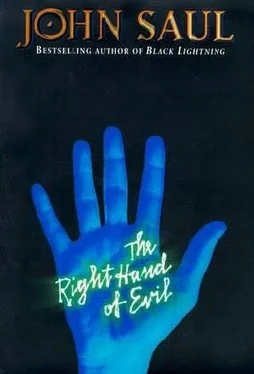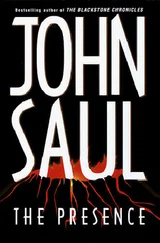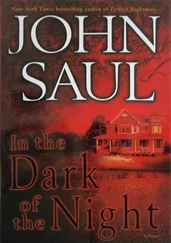She couldn't even count them.
It wasn't until she'd started dialing the old-fashioned Princess phone on the nightstand that she remembered it wasn't hooked up. The telephone man was supposed to come today.
This morning, or this afternoon?
She couldn't remember.
And suddenly she didn't care.
Get through it, she told herself. Just get dressed, fix some breakfast, get the kids off to school, and get through it. He'll come back. He always does. And when he does …
When he did, she would be ready. She'd have a suitcase packed, and one for the kids, and as soon as he showed up, she'd take the car, and that would be that. She'd put Molly and Scout in the backseat, pick up the kids at St. Ignatius, and they'd be gone.
Pulling on her robe, she lifted Molly-who was rubbing her eyes sleepily-out of her crib, unlocked the bedroom door, and carried her youngest daughter down to the kitchen. Kim had already started a pot of coffee and was getting cereal and milk out of the refrigerator.
But there was no sign of Jared, who was usually up even earlier than Kim.
"Where's your brother?" she asked.
Kim's eyes clouded and she shrugged her shoulders. "Still asleep, I guess," she said. The listlessness in her voice spoke far more clearly than the words she had uttered.
They'd heard it all, Janet thought. They both heard the whole thing. "I guess you know I've decided to leave your father," she said carefully.
Kim turned to look at her. "You mean we're going back to Shreveport?"
Janet hesitated, then nodded. Now that Kim had spoken the words out loud, she realized that this time she really did mean it. She bit her lip, trying to hold back tears, but couldn't hold them back any longer. "I just can't take it anymore," she said, crying softly now. "I can't, and you and Jared can't, either. I don't know what we're going to do, but I don't know what else to do. I-" Janet sank into one of the kitchen chairs as Molly began crying, too.
Kim lifted her little sister out of her mother's arms. "It'll be okay, Mom," she said as Molly calmed down. "We'll figure it out. Jared and I can get jobs after school-"
She stopped abruptly, and Janet realized someone else had just come into the room. No, she said silently to herself. Don't let it be Ted. Not now. Not right now. Just give me a little time. But when she turned, she saw that it wasn't Ted, it was Jared.
Her son stood in the doorway, his worn denim jacket slung carelessly over his shoulder. His head was cocked and his eyes were fixed on Kim.
"What do you mean, we'll get jobs after school?" Jared asked.
Janet opened her mouth, but it was Kim who spoke. "Mom says we're going back to Shreveport. After last night-"
"Yeah, right," Jared cut in, rolling his eyes scornfully. "Mom's not going anywhere. None of us are." With a derisive toss of his head, he turned away. "See you at school."
He was gone before either Kim or Janet could speak. The front door slammed. As Molly began crying again, Janet once more struggled to control her own tears. "Oh, God," she said, her voice breaking as the turmoil of emotions she'd been through since she'd awakened overwhelmed her. "I'm sorry. I'm so sorry. How could I have put you both through all of this?" She buried her face in her hands, sobbing.
"It'll be all right, Mom," she heard her daughter say, Kim's hand on her shoulder. "As soon as we get out of here, everything will be all right."
Fifteen minutes later, after cleaning up the kitchen, Kim left the house for St. Ignatius.
It wasn't until she was halfway there that it hit her.
Not once had she walked to school alone, she realized. Always before, until this morning, Jared had been with her.
But not today.
Today she was walking by herself.
But it was more than that: today she couldn't even find Jared in that strange corner of her mind where, for as long as she could remember, she'd always felt his presence, always felt a connection to her twin.
Today, that connection was gone.
Today, she was truly by herself.
The problem with being mayor of St. Albans-or anyplace else, for that matter-was that you had to be nice to everyone, whether you liked them or not. And with the man who now sat across from Phil Engstrom, who had held the office of mayor for ten years, and fully intended to hold it for at least twenty more, the problem became a double-edged sword. Mayor Engstrom's visitor that morning was Father MacNeill, who was not only a constituent-though the priest regularly assured him that the Church was always above politics-but was Phil Engstrom's confessor, as well. The cleric invariably provided the extra emphasis to the word always in his disclaimer of any church interest in local politics, as if somehow that would convince Engstrom of the statement's veracity. The fact that Phil had never particularly liked MacNeill only added to the problem, but at least this morning nothing so important as his soul was at stake. Of course, his dislike of the priest had long ago made him less than candid in the confessional. That, he thought, combined with his recent yearnings to skip mass entirely in favor of putting in eighteen holes at the new course up in Valhalla, had undoubtedly already condemned him to an eternity in purgatory, or worse. Now, as the priest finally came to the point after ten minutes of small talk to which Engstrom had made all the proper responses, he put on his best look of concerned interest.
"It just doesn't seem that the old Conway house is the right place for a hotel," the priest said. "It's always been a residential area, and if we allow one commercial enterprise to take root there, how can we protect the integrity of the neighborhood?"
Engstrom leaned back in his chair, tenting his fingers over a belly that had lately been suffering from a little too much of his wife's perfectly fried chicken. "I'm not exactly sure I'm followin' your interest in all this," he said, sweetening his voice with a little extra drawl and putting on a look of vague confusion. "Sort of seems like fixin' the old Conway place up would be good for the community. Pretty old house like that-seems a shame to just let it go to the kudzu, now doesn't it? And now's I think about it, it's not really in any specific neighborhood, is it? Not too many houses out there on Pontchartrain, and it's at the end of the street, kinda set off by itself, so it doesn't hardly seem like much of a variance would have to be made." Something flashed over the priest's face that Phil Engstrom couldn't quite put his finger on. "'Course, if there's somethin' I don't know about, I'm sure here to listen." He gave the priest a smile.
"Just like you're always there to hear me out when I been less than the man I'd like to be, right?"
Father MacNeill returned the smile, but Engstrom felt no warmth from it. "It is a lovely old house," the priest agreed, but something in his voice warned the mayor what was coming next. "But I'm not sure the Conways are the kind of people we want to encourage."
Aha! Engstrom thought. Now we get to the grits. "An' why might that be?" he asked. "Ya'll know somethin' about 'em that the rest of us don't?"
Father MacNeill's lips pursed and his expression tightened, a sign that he was about to confide in the mayor.
Sure enough, the priest leaned forward slightly, and his eyes darted around the office as if seeking some unseen person who might be eavesdropping. "If I might speak confidentially…?" he began, letting his voice trail off in an invitation to Engstrom to reassure him that his confidence would not be violated.
"Ya'll can think of this office as my own personal confessional," the mayor said, picking up his cue. "You'd be surprised the things I've heard in here, and I'm happy to tell you there's not a single soul in St. Albans ever regretted talkin' to me."
Читать дальше












